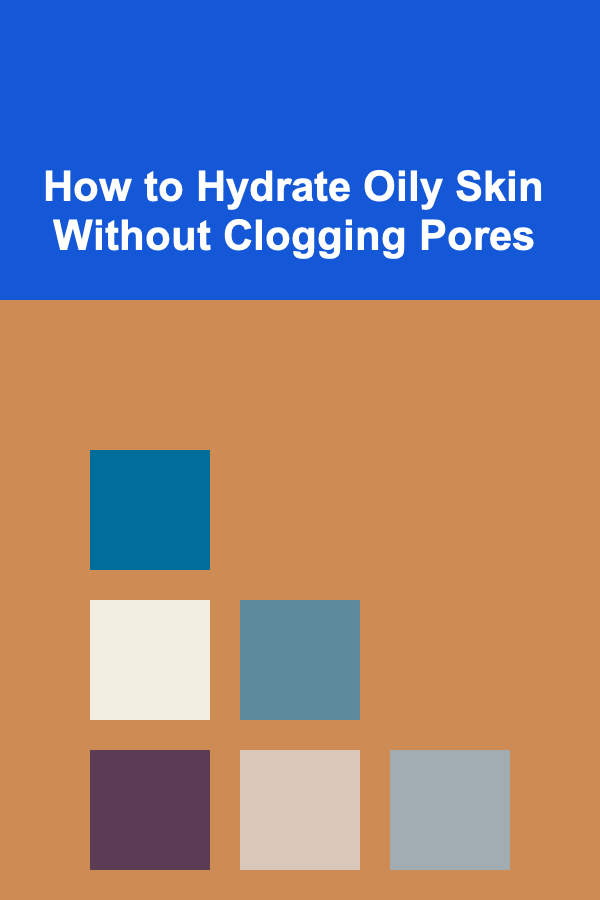
How to Hydrate Oily Skin Without Clogging Pores
ebook include PDF & Audio bundle (Micro Guide)
$12.99$5.99
Limited Time Offer! Order within the next:

Oily skin can be a tricky concern for many people, especially when it comes to hydration. The common belief is that oily skin doesn't need moisture, or that hydrating products will clog pores and worsen acne. However, skin hydration is essential for maintaining a healthy, balanced complexion, even for those with oily skin. The key is finding the right products and techniques that hydrate without exacerbating oil production or causing breakouts. In this article, we will explore how to hydrate oily skin effectively without clogging pores, addressing misconceptions, the science behind hydration, and practical tips.
Understanding Oily Skin
Before delving into how to hydrate oily skin, it's important to first understand what makes skin oily. Oily skin is characterized by an overproduction of sebum, the natural oil produced by sebaceous glands in the skin. Sebum is necessary to protect and lubricate the skin, but excess sebum can cause clogged pores, leading to acne, blackheads, and an overly shiny appearance.
Several factors contribute to oily skin, including genetics, hormonal changes, environmental factors, and improper skincare routines. When oily skin lacks proper hydration, the skin may compensate by producing even more sebum, leading to a cycle of excessive oil production. The solution to this problem is not to dry out the skin but to provide hydration that balances the skin's natural moisture levels.
The Importance of Hydration for Oily Skin
Contrary to popular belief, oily skin still needs hydration. Hydration involves the retention of water in the skin's outer layers, whereas oil (sebum) serves as a barrier to prevent dehydration. If oily skin becomes too dehydrated, it will often try to compensate by producing even more oil, leading to more shine and potential breakouts.
Hydration can help maintain the skin's elasticity, improve texture, and support its natural barrier function. The goal is to hydrate the skin without contributing to excess oil production or clogging pores. This can be achieved with the right combination of hydrating ingredients and careful product selection.
Key Ingredients for Hydrating Oily Skin
When selecting products for oily skin, it's essential to look for ingredients that hydrate without contributing to clogged pores or excessive oil production. Below are some key ingredients that are both hydrating and non-comedogenic (meaning they won't clog pores).
1. Hyaluronic Acid
Hyaluronic acid is a powerful humectant, which means it draws moisture into the skin from the environment. It is an excellent ingredient for oily skin because it hydrates without adding excess oil. Unlike heavier creams, hyaluronic acid provides lightweight moisture that helps to plump the skin and improve its texture without clogging pores.
Because hyaluronic acid can hold up to 1,000 times its weight in water, it helps the skin retain moisture, preventing it from becoming too dry or dehydrated. It's an ideal ingredient for oily skin, as it provides the hydration necessary without making the skin feel greasy.
2. Glycerin
Glycerin is another humectant that draws moisture into the skin, keeping it hydrated without contributing to oiliness. Glycerin works by helping the skin retain water, which prevents the skin from becoming dry or tight. It is a non-comedogenic ingredient, meaning it won't clog pores, making it suitable for oily and acne-prone skin.
3. Aloe Vera
Aloe vera is well-known for its soothing and hydrating properties. It's particularly beneficial for oily skin because it provides lightweight moisture while also calming inflammation, which can be common in oily or acne-prone skin. Aloe vera can hydrate without leaving a greasy residue, making it an ideal choice for hydration without clogging pores.
4. Niacinamide
Niacinamide, also known as vitamin B3, is a powerhouse ingredient for oily and acne-prone skin. It regulates sebum production, which helps to balance the skin's natural oil levels. Niacinamide also improves the skin's barrier function, which is crucial for maintaining hydration. In addition, it has anti-inflammatory properties that can help reduce redness and irritation associated with acne.
5. Lightweight Oils
While oils may sound counterintuitive for oily skin, certain lightweight oils can hydrate without clogging pores. Oils such as squalane, jojoba oil, and rosehip oil are non-comedogenic and can provide hydration without overwhelming the skin. These oils mimic the skin's natural sebum, which can help balance oil production while providing moisture.
Squalane, in particular, is an excellent choice for oily skin because it is light and non-greasy, making it suitable for daily use. Jojoba oil is also a great option as it closely resembles the skin's natural oils, helping to prevent the skin from producing excessive amounts of oil.
Tips for Hydrating Oily Skin Without Clogging Pores
To hydrate oily skin effectively, it's important to use the right products and adopt a proper skincare routine. Here are some practical tips to keep your skin hydrated without contributing to clogged pores or excess oil production.
1. Use a Lightweight Moisturizer
Oily skin doesn't need heavy, greasy moisturizers. Instead, opt for lightweight, oil-free, or gel-based moisturizers that provide hydration without clogging pores. Look for products that are labeled as "non-comedogenic," which means they are less likely to clog pores.
Gel moisturizers are a great choice for oily skin because they are often water-based and contain ingredients like hyaluronic acid or glycerin, which hydrate without leaving a greasy residue. These products provide moisture without weighing down the skin, leaving it fresh and hydrated.
2. Incorporate Hydrating Toners
Toners can help balance the skin's pH and provide additional hydration after cleansing. For oily skin, look for alcohol-free toners that contain hydrating ingredients like aloe vera, glycerin, or rose water. These toners help replenish moisture and prepare the skin for subsequent treatments.
Avoid toners with astringents like alcohol, as they can dry out the skin and trigger an overproduction of sebum, leading to more oil. Hydrating toners, on the other hand, add moisture without causing breakouts.
3. Avoid Over-Washing Your Face
It may be tempting to wash your face multiple times a day to combat oiliness, but over-washing can strip the skin of its natural oils. This can lead to dehydration and an increase in oil production as the skin tries to compensate for the loss of moisture. Wash your face twice a day---once in the morning and once before bed---with a gentle, hydrating cleanser.
Look for cleansers that are sulfate-free and formulated for oily or acne-prone skin. Cleansers with ingredients like salicylic acid can help prevent clogged pores, but make sure they also contain hydrating ingredients to avoid stripping the skin of moisture.
4. Exfoliate Regularly, But Gently
Exfoliation is key for preventing clogged pores and promoting cell turnover, but over-exfoliating can irritate oily skin and strip it of hydration. Exfoliate your skin 1-2 times a week with a gentle exfoliant that contains alpha hydroxy acids (AHAs) or beta hydroxy acids (BHAs), which can help remove dead skin cells and prevent clogged pores.
Avoid harsh physical exfoliants with rough scrubbing particles, as they can irritate the skin and increase oil production. Chemical exfoliants, such as salicylic acid, are more effective and gentler for oily skin.
5. Use a Hydrating Face Mask
Hydrating face masks are a great way to provide an extra boost of moisture to oily skin. Look for masks with ingredients like hyaluronic acid, aloe vera, or glycerin, which will hydrate and soothe the skin. Sheet masks and clay masks can both be beneficial, as long as the product is formulated with non-comedogenic ingredients.
If you have acne-prone skin, look for masks that contain soothing and calming ingredients like green tea or chamomile. These ingredients can reduce inflammation while providing much-needed hydration.
6. Stay Hydrated
While topical products play a significant role in skin hydration, it's equally important to stay hydrated from the inside. Drink plenty of water throughout the day to help maintain your skin's natural moisture balance. Dehydration can lead to dry, tight skin, prompting the sebaceous glands to produce more oil in an attempt to compensate.
Aim for at least 8 glasses of water a day, and incorporate hydrating foods into your diet, such as cucumbers, watermelon, and leafy greens.
Conclusion
Hydrating oily skin without clogging pores is all about finding the right balance. By using lightweight, non-comedogenic products and adopting a gentle skincare routine, you can effectively hydrate your skin while controlling oil production. Key ingredients like hyaluronic acid, glycerin, and aloe vera can provide the necessary moisture without overwhelming the skin.
Remember, hydration is essential for maintaining healthy, glowing skin, even if you have oily skin. By selecting the right products, avoiding over-washing, and staying consistent with your skincare routine, you can keep your skin balanced, hydrated, and free from clogged pores.

Boost Your Sales with Persuasive Techniques: Essential Tools for Real Estate Agents
Read More
How to Budget for Family Vacation Plans Without Breaking the Bank
Read More
How to Create a Family Reunion Website for Easy Coordination
Read More
How to Create an Interactive Space for Small Pets
Read More
How to Make Money Online as a Travel Planner: 10 Actionable Ideas
Read More
How to Design Plumbing for Laboratories and Healthcare Facilities
Read MoreOther Products

Boost Your Sales with Persuasive Techniques: Essential Tools for Real Estate Agents
Read More
How to Budget for Family Vacation Plans Without Breaking the Bank
Read More
How to Create a Family Reunion Website for Easy Coordination
Read More
How to Create an Interactive Space for Small Pets
Read More
How to Make Money Online as a Travel Planner: 10 Actionable Ideas
Read More